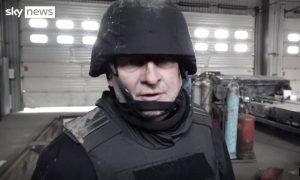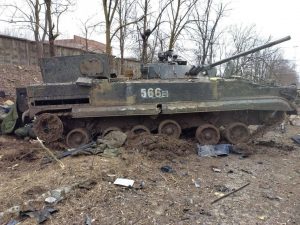London – In a new censorship move against foreign journalists in the country and the UK, Russia has banned the entry of 29 professionals from the main British media and 20 others accused of being linked to the country’s “defense complex”.
Editors-in-Chief, editors, reporters and correspondents from the BBC, The Independent, The Times, The Guardian and other news organizations are now banned from entering and working in the country, the State Department said on Tuesday.
In announcing the list, the ministry justified the measure as a response to “anti-Russian actions by the British government”.
window.uolads.push({ id: "banner-300x250-3-area" });
Russia’s censorship of politically biased British journalists
Since the start of the war in Ukraine, the UK has taken a strong stance in favor of the occupied country, drawing the anger of Vladimir Putin.
The measure has no practical effect in the press, but it does have a political one, as most of those vetoed are bosses or senior executives who do not travel to the country to work.
Among the 29 journalists are John Witherow, editor-in-chief of The Times; Sky News chief correspondent Stuart Ramsay; Chris Evans, editor-in-chief of the Daily Telegraph; Tim Davie, CEO of BBC Television; Katharine Viner, editor-in-chief of The Guardian; Edward Verity, editor-in-chief of the Daily Mail; and Christian Broughton, editor-in-chief of The Independent.
Ramsey made headlines after surviving an attack by Russian forces on the car in which he was traveling with other journalists in March. He was shot and now follows the war in Ukraine.
Read more
In Ukraine, the car with British journalists was ambushed, two were injured; Watch the video
But there are also British reporters, correspondents and columnists from the BBC, Channel 4, ITV, Financial Times, The Sunday Times, Daily Telegraph, The Guardian and Sky News.
According to the Russian authorities, the banned journalists are “involved in the deliberate dissemination of false and one-sided information about Russia and events in Ukraine and the Donbas.”
“With their biased assessments, they also contribute to fueling Russian hostility in British society,” the ministry said in a statement.
The Russian government said the inclusion of the names of military personnel, politicians and other “persons associated with the defense complex” in the UK was due to their involvement in “decision-making processes regarding the supply of arms to Ukraine”.
Names include members of the British Ministry of Defense, parliamentarians, naval officers and executives of private companies.
In an earlier list, entry into Russia by Prime Minister Boris Johnson and other members of the UK government had already been vetoed.
read it too
Wikipedia defies Russian censorship and does not remove content about the war in Ukraine
Veto over journalists after UK sanctions
Russia’s veto of British journalists and military personnel, End of broadcast by state broadcaster RT (Russia Today) in the United Kingdom.
One of the branches of Russian propaganda had permission to broadcast on the Queen’s territory, which was canceled in March due to the invasion of Ukraine.
In a similar manner, The Moscow office of CBC/Radio-Canada was closed in May in retaliation for the Russian state television ban in Canada.. Canadian professionals were “invited” to leave the country within three weeks of ordering.
In addition, Britain, like other Western countries, imposed a number of sanctions on the Russian government.
Recently, Prime Minister Boris Johnson shared that he is in contact with President Volodymyr Zelensky, sharing updated information on the conflicts in Ukraine.
“It is clear that the Ukrainian people will not succumb to Russian atrocities,” Johnson said on Twitter. “We are unwavering in our mission to ensure that Ukraine is defended and supported in the long term.”
President @ZelenskyyUa Just updated me about the ongoing war against Russian aggression in Donbas.
It is clear that the Ukrainian people will not succumb to Russian atrocities. We remain unwavering in our mission to ensure the long-term defense and support of Ukraine. pic.twitter.com/eiW0buOrX4
— Boris Johnson (@BorisJohnson) June 6, 2022
‘Forbidden list’ sparked reactions
Reporters Without Borders (RSF) spoke about the Kremlin’s “No List” and said it was “extremely concerned about the increased censorship that bans 29 British journalists from entering Russia.”
“The Kremlin decision was ‘wrong’ [relatos]’ About the war in Ukraine and the country’s ‘hostile actions’,” the NGO posted on Twitter.
“During the war, Parliament proposed a series of laws aimed at controlling the media and information.
A bill that would allow a prosecutor to quickly revoke the accreditation of journalists without trial is about to be signed by Putin and threatens journalists still in the country.”
During the war, Parliament proposed a series of laws aimed at controlling the media and information. The law, which allows a prosecutor to quickly revoke journalists’ accreditation without trial, is about to be signed by Putin and threatens journalists still in the country. 2/2 pic.twitter.com/JJXnAHTw0k
— RSF (@RSF_inter) 15 June 2022
A spokesperson for The Guardian described the Russian government’s move as “disappointing” and said it was a bad day for press freedom.
“Reliable and accurate journalism is more important than ever, and despite this decision, we will continue to report on Russia and its invasion of Ukraine.”
read it too
source: Noticias
[author_name]

